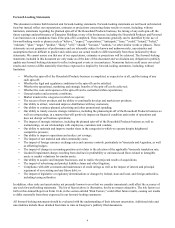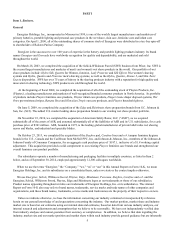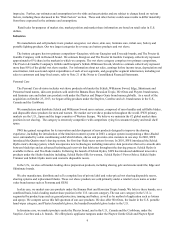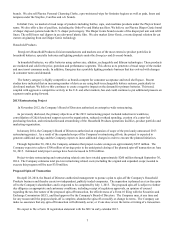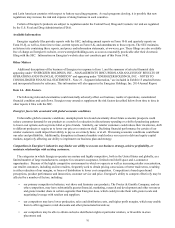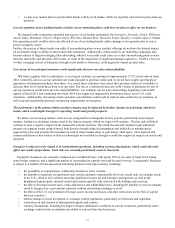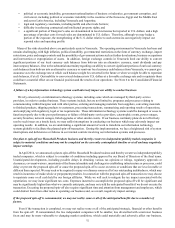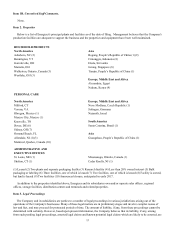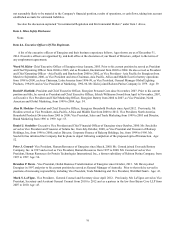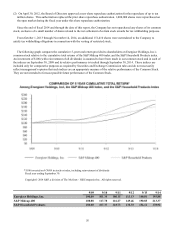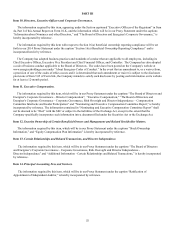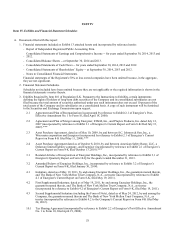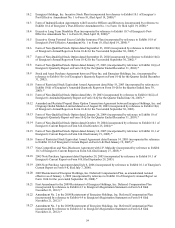Energizer 2014 Annual Report Download - page 18
Download and view the complete annual report
Please find page 18 of the 2014 Energizer annual report below. You can navigate through the pages in the report by either clicking on the pages listed below, or by using the keyword search tool below to find specific information within the annual report.at a lower cost relative to ours and sell at a lower price. If we fail to develop and launch successful new products, or fail to
reduce our cost structure to a competitive level, we may be unable to grow our business and compete successfully.
Energizer's business is subject to regulation in the U.S. and abroad.
The manufacture, packaging, labeling, storage, distribution, advertising and sale of our products are subject to extensive
regulation in the U.S., including by the Food and Drug Administration, the Consumer Product Safety Commission, the
Environmental Protection Agency, and by the Federal Trade Commission with respect to advertising. Similar regulations have
been adopted by authorities in foreign countries where we sell our products, and by state and local authorities in the U.S. New
or more restrictive regulations or more restrictive interpretations of existing regulations, particularly in the battery, skin care
and feminine care industries, are likely and could have an adverse impact on our business. Legislative and regulatory changes
by taxing authorities have an impact on our effective tax rate, and we may be subject to additional costs arising from new or
changed regulations, including those relating to health care and energy. Additionally, a finding that we are in violation of, or
not in compliance with, applicable laws or regulations could subject us to material civil remedies, including fines, damages,
injunctions or product recalls, or criminal sanctions. Even if a claim is unsuccessful, is not merited or is not fully pursued, the
negative publicity surrounding such assertions could jeopardize our reputation and brand image and have a material adverse
effect on our businesses, as well as require resources to rebuild our reputation.
We must comply with various environmental laws and regulations in the jurisdictions in which we operate, including those
relating to the handling and disposal of solid and hazardous wastes, recycling of batteries, and the remediation of contamination
associated with the use and disposal of hazardous substances. A release of such substances due to accident or an intentional act
could result in substantial liability to governmental authorities or to third parties. We have incurred, and will continue to incur,
capital and operating expenses and other costs in complying with environmental laws and regulations, including remediation
costs relating to our current and former properties and third party waste disposal sites. We could become subject to additional
environmental liabilities in the future that could cause a material adverse effect on our results of operations or financial
condition.
The resolution of Energizer's tax contingencies may result in additional tax liabilities, which could adversely impact our
cash flows and results of operations.
Significant estimation and judgment is required in determining our tax provisions for taxes in the U.S. and jurisdictions
outside the U.S. In the ordinary course of our business, there are transactions and calculations in which the ultimate tax
determination is uncertain. We are regularly under audit by tax authorities, and although we believe our tax positions are
defensible and our tax provision estimates are reasonable, the final outcome of tax audits and related litigation could be
materially different than that reflected in our income tax provisions and accruals. The unfavorable resolution of any audits or
litigation could have an adverse impact on future operating results and our financial condition.
Changes in production costs, including raw material prices, could erode Energizer's profit margins and negatively impact
operating results.
Pricing and availability of raw materials, energy, shipping and other services needed for our business can be volatile due to
general economic conditions, labor costs, production levels, import duties and tariffs and other factors beyond our control.
There is no certainty that Energizer will be able to offset future cost increases. This volatility can significantly affect our
production cost, and may, therefore, have a material adverse effect on our business, results of operations and financial
condition. If the proposed spin-off is completed, the two independent companies will be smaller and have less consolidated
purchasing scale. As a result, raw material and other goods and services prices may increase.
Energizer's manufacturing facilities or supply channels may be subject to disruption from events beyond our control.
Operations of our manufacturing and packaging facilities worldwide may be subject to disruption for a variety of reasons,
including availability of raw materials, work stoppages, industrial accidents, disruptions in logistics, loss or impairment of key
manufacturing sites, product quality or safety issues, licensing requirements and other regulatory issues, trade disputes between
countries in which we have operations, such as the U.S. and China, and acts of war, terrorism, pandemics, fire, earthquake,
flooding or other natural disasters. The supply of our raw materials may be similarly disrupted. There is also a possibility that
third party manufacturers, which produce a significant portion of certain of our products, could discontinue production with
little or no advance notice, or experience financial problems or problems with product quality or timeliness of product delivery,
resulting in manufacturing delays or disruptions, regulatory sanctions, product liability claims or consumer complaints. If a
major disruption were to occur, it could result in delays in shipments of products to customers or suspension of operations. The
14


